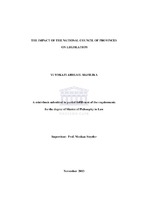The impact of the national council of provinces on legislation
Abstract
The paper focuses on the role of the National Council of Provinces (NCOP) in the national legislative process. An enquiry into the relevance of the NCOP when processing bills during the Third Parliament has been critical when reviewing this role. The paper studied all the bills processed by Parliament with particular interest in the amendments proposed by the NCOP. The legislative framework in which the NCOP functions was critical to determine whether it enables this institution to adequately fulfill this role. The objective of this paper was to assess whether or not the NCOP fulfills its constitutional role of representing provincial interests in the national legislative process. The paper has uncovered the following regarding the NCOP’s role in the national legislative process. • The NCOP role varies according to the different pieces of legislation it is considering. This means that the manner in which it processes and passes ordinary bills affecting provinces will be different from the way it considers those bills not affecting provinces. • The NCOP has thorough consultative process on bills affecting provinces, compared to the superficial role it plays on bills not affecting provinces. More ordinary bills not
affecting provinces have been processed by Parliament; however, the NCOP has
proposed more amendments to the minority of bills affecting provinces. • The electoral system of South Africa has weakened the caliber of delegates in the
NCOP. This has unintended consequences on the strength of the NCOP as an
institution to abide by its decisions or to challenge the National Assembly when there are disagreements. • The NCOP may be misguided about its role at times and not strategically situated to focus on matters of provincial competence. x The paper argues that the NCOP remains relevant and has achieved its constitutional
mandate of representing the interests of provinces. However, more work needs to be done to ascertain a common view of what constitutes provincial interests. Furthermore, the NCOP should confine its scope to matters of provincial competence. Thus the small number of delegates will be focused on the issues that reflect the core mandate of this institution.

